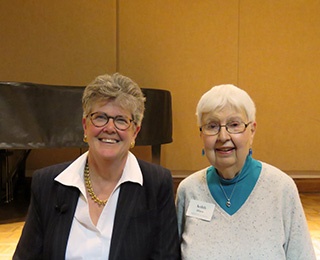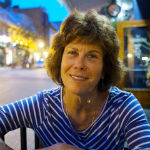Published: January 16, 2018
 A little over a year ago, Tracey Lind looked in the mirror and did not recognize the face reflected in the glass.
A little over a year ago, Tracey Lind looked in the mirror and did not recognize the face reflected in the glass.
Thus began an unchartered road that Tracey now travels. Diagnosed with early onset dementia, Tracey ended her 17-year tenure as Dean of Cleveland’s Episcopal Trinity Cathedral and spends her time traveling with her spouse, Emily, writing, preaching and giving speeches as she is able.
“I am learning to love the person I did not recognize,” the 63-year-old woman recently told an overflow crowd at Kendal at Oberlin.
Tracey’s diagnosis is Frontotemporal Dementia (FTD), a dementia that affects communication and language, mobility and memory.
Tracey talked of the many changes in her daily life. Skills that came easy, such as operating a camera or tying sailor knots, are difficult. She loves to travel and hike, but now gets anxious and tentative in airports and on trails. A self-described foodie, she takes time to review a menu before heading to a restaurant.
Tracey’s message to Kendal residents and staff, though, was full of hope and inspiration about a disease that will touch millions of us.
Dementia Cases Growing Worldwide
About 50 million people have dementia worldwide, with that number projected to reach 82 million by 2030, according to the World Health Organization.
“Dementia is one of the major causes of disability and dependency among older people worldwide. It is overwhelming not only for the people who have it, but also for their caregivers and families. There is often a lack of awareness and understanding of dementia, resulting in stigmatization and barriers to diagnosis and care. The impact of dementia on caregivers, family and societies can be physical, psychological, social and economic,” the WHO writes.
There are many different forms of dementia, with Alzheimer’s as the most common. Although dementia mainly affects older people, it is not a normal part of aging.
As more people are diagnosed with dementia, finding affordable housing will be an increasingly challenging problem, Tracey says. “The Kendals of the world must advocate,” she says.
Tracey applauded Kendal’s new Jameson House, a memory supported community for up to 12 residents with mild to moderate cognitive changes. But other initiatives are needed, she said, especially for those people without financial resources and supportive families.
Tracey’s spouse, Emily, is her care partner, a term that more aptly describes their relationship than “care receiver” and “caregiver.”
Emily told the audience that they have one business card that lists both names. “She’s talent, I’m logistics,” Emily quipped.
Therapeutic Qualities of Mindfulness
Tracey says a key element for her is learning to “be here now” through meditation and yoga, contemplative prayer, writing, music, gardening and walking. As she lets go of her old life, she says she is discovering a new one full of “unexpected gifts.”
Family and friends continue to play a major role in her life, and she offers suggestions for those caring for a loved one with dementia.
- If you suspect a loved one has signs of dementia, encourage seeing a doctor, as early diagnosis can improve one’s quality of life.
- Take a “realistic but positive approach.”
- Be patient.
- Denial is not useful, honesty is.
- Show respect, and don’t be put off if the person is sitting in a wheelchair, drooling and hugging a teddy bear.
Tracey says she is likely to end up in a wheelchair, unable to talk but aware of what is going on. The average life expectancy of someone with FTD is seven to 10 years.
“As long as I am able I will preach and continue to tell my story,” she says. In a TEDx Talk given several years ago, Tracey described the beginning of her faith journey: How I Met God in a McDonald’s.”
She is writing a blog and hopes to write a second book. Her first book, Interrupted by God: Glimpses from the Edge, was published in 2004.
 In the past, Molly Kavanaugh frequently wrote about Kendal at Oberlin for the Cleveland Plain Dealer, where she was a reporter for 16 years. Now we are happy to have her writing for the Kendal at Oberlin Community.
In the past, Molly Kavanaugh frequently wrote about Kendal at Oberlin for the Cleveland Plain Dealer, where she was a reporter for 16 years. Now we are happy to have her writing for the Kendal at Oberlin Community.





